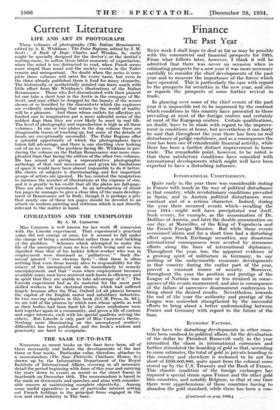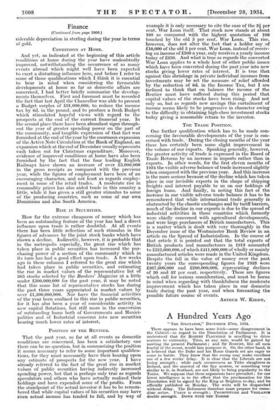Finance
The Past Year
NEXT week I shall hope td deal as far as may be possible with the commercial and financial -prospects for 1985. From what follows later, however, I think it will be admitted that there was never an occasion when in estimating prospects for a new year it was more necessary carefully to consider the chief developments of the past year and to measure the importance of the forces which have operated. This is particularly the case with regard to the prospects for securities in the new year, and also as regards the prospects of some further revival in trade.
In glancing over some of the chief events of the past year it is impossible not to be impressed by the contrast which conditions in this country have presented to those prevailing at most ,of tie foreign centres and certainly at most of the European centres. Certain qualifications, no doubt, have to be made with regard to the improve- ment in conditions at home, but nevertheless it can fairly be said that throughout the year there has been no real disturbance of pule confidence, and as a consequence the year hai been one -5f. considerable financial activity, while there has been a further distinct improvement in home trade. The remarkable point, however, to be noted is that these satisfactory conditions have coincided with international developments which might well have been expected to have a disturbing influence.
INTERNATIONAL UNSETTLEMENT.
Quite early in the year there was considerable rioting in France with much in the way of political disturbance in that country, while revolutionary conditions prevailed in Spain, and in Austria political disturbances were constant and of a serious character. Indeed: during the year there occurred events which—recalling the year 1914—might well have precipitated war itself. Such events, for example, as the assassination of Dr. Dollfuss of Austria, and later the double assassination on one day, at Marseilles, of the King of Yugoslavia and the French Foreign Minister. But while those events occasioned 'alarm and for a short time had a disturbing effect upon .Stock Exchange securities, any disastrous international consequences were averted by strenuous efforts along the lines of international diplomacy. • Throughout the year, too, the apparent evidence of a growing ' spirit of militarism in Germany, to say nothing of the unfavourable economic developments in that country during the earlier part of the year, proved a constant source of anxiety. Moreover, throughout the year the position and prestige of the League of Nations was more or less strained in conse- quence of the events enumerated, and also in consequence of the failure of successive disarmament conferences to bring about the desired results. Nevertheless, towards the end of the year the authority and prestige of the League was somewhat strengthened by the successful efforts to bring about a better understanding between France and Germany with regard to the future of the Saar.
ECONOMIC FACTORS.
Nor have the disturbing developments in other coun- tries been confined to political affairs, for the devaluation of the dollar by President Roosevelt early in the year intensified the chaos in international currencies and further stimulated the hoarding of gold so that, according to some estimates,the total of gold in private hoarding in this country and elsewhere is reckoned to be not far short of £200,000,000, quite apart from the colossal sums stored up by the U.S. Treasury and the Bank of France. This chaotic condition of the foreign exchanges has imposed a special strain upon France and the other gold bloc countries, and notably Belgium, so that at one time there' were apprehensions of those countries having to abandon the gold standard, while there has been a con- , (Continued on p3ge 1008.) . - - Finance (Continued from page 1006.) siderable depreciation in sterling during the year in terms of gold.
CONDITIONS AT HOME.
And yet, as- indicated at the beginning of this article conditions at home during the year have undoubtedly improved, notwithstanding the occurrence of so many events abroad which might well have been expected to exert a disturbing influence here, and before I refer to some of those qualifications which I think it is essential to bear in mind when considering the favourable developments at home so far as domestic affairs are concerned, I had better briefly summarize the develop- ments themselves. First and foremost must be recorded the fact that last April the Chancellor was able to present a Budget surplus of £31,000,000, to reduce the income tax by 6d. in the pound, and to produce a fresh Budget which stimulated hopeful views with regard to the prospects at the end of the current financial year. In the second place there have been abundant signs through- out the year of greater spending power on the part of the community, and tangible expression of that fact was furnished at the end of the year by the enormous expansion of the Active Note Circulation at the Bank of England, an expansion which at the end of December usually represents cash taken out for Christmas expenditure. Moreover, evidence of improved conditions at home have also been furnished by the fact that the four leading English Railways have shown an increase of over £5,000,000 in the gross receipts as compared with the previous year, while the figures of employment have been of an encouraging character, and not least as regards employ- ment in some of the retail trades. A moderate rise in commodity prices has also aided trade in this country a little, while it has given a still greater stimulus to some of the producing countries, such as some of our own Dominions and also South America.
RISE IN SECURITIES.
How far the extreme cheapness of money which has been an outstanding feature of the year has had a direct influence upon trade is rather doubtful. At all events there has been little reflection of such stimulus in the figures of advances by the joint stock banks which have shown a decline. Indirectly, however, it is probable that in the metropolis especially, the great rise which has taken place in public securities has increased the pur- chasing power of a section of the community which in its turn has had a good effect upon trade. A few weeks ago in these columns I referred to the great rise which had taken place in public securities, and estimating the rise in market values of the representative list of 865 stocks selected by the Bankers' Magazine at a little under £500,000,000 for the past year, it may be noted that this same list of representative stocks has during the past three years appreciated in market values by over £1,500,000,000. Nor have the financial activities of the year been confined to this rise in public securities, for it has also been a year of considerable activity in new capital flotations, but still more in the conversion of outstanding loans both of Governments and Munici- palities and of Industrial concerns into new securities bearing much lower rates of interest.
POSITION OF THE RENTIF-R.
That the past year, so far at all events as domestic conditions are concerned, has been a satisfactory one there can be no question, but in summarizing the position it seems necessary to refer to some important qualifica- tions, for they must necessarily have their bearing upon any estimate of prospects for the new year. I have already referred to the fact of the great rise in market values of public securities having indirectly increased spending power, but that is perhaps only true as regards speculators and others who have actually realized their holdings and have expended some of the profits. From the standpoint of the actual investor it has to be remem- bered that while capital values of his securities may have risen actual income has tended to fall, and by way of example it is only necessary to cite the case of the 31 per cent. War Loan itself. That stock now stands at about 108 as compared with the highest quotation of 106 touched by the old 5 per cent. War Loan. This rise, however, does not alter the fact that a holder say of £10,000 of the old 5 per cent. War Loan, instead of receiv- ing an income of 1500 a year, only receives a yearly income today of £350. And what is true as regards the converted War Loan applies to a whole host of other public issues which have been converted during the past year into new stocks giving lower rates of interest. It is true that against this shrinkage in private individual incomes from investments may be set the measure of relief afforded by the reduction of 6d. in the: Income Tax, but I am inclined to think that on balance the income of the Rentier must have suffered during this period that capital values of the stocks have been rising. And not only so, but as regards new savings this curtailment of income seems likely to be progressive in character owing to the difficulty in obtaining high-class investment stocks today giving a reasonable return to the investor.
THE TRADE POSITION.
One further qualification which has to be made con- cerning the favourable developments of the year is con- cerned with trade. t During the closing months of the year there has certainly been some slight improvement in the volume of our exports. Speaking generally, however, the greater activity of trade is expressed in the Board of Trade Returns by an increase in imports rather than in exports. In other words, for the first eleven months of 1934 the visible adverse balance of trade increased slightly when compared with the previous year. And this increase is the more serious because of the decline which has taken place in our invisible exports in the shape of shipping freights and interest payable to us on our holdings of foreign loans. And finally, in noting this fact of the increase in our visible adverse trade balance it has to be remembered that while international trade generally is obstructed by the chaotic exchanges and by tariff barriers, much of the decline in our exports is due to the spread of industrial activities in those countries -which formerly were chiefly concerned with agricultural developments, and were large purchasers of British manufactures. This is a matter which is dealt with very thoroughly in the December issue of the Westminster Bank Review in an article on the Spread of Industrialism. In the course of that article it is pointed out that the total exports of British products and manufactures in 1913 amounted to £525,000,000, of which £411,000,000 of wholly or mainly manufactured articles were made in the United Kingdom. Despite the fall in the value of money over the past twenty years the corresponding figures for 1933 were £367,000,000 and £280,000,000, representing declines of 30 and 32 per cent. respectively. These are figures which call for serious consideration, and must be borne in mind when regarding with thankfulness the moderate improvement which has taken place in our domestic trade during the past year, and when forecasting the possible future course of events.
ARTHUR W. KIDDY,



































 Previous page
Previous page